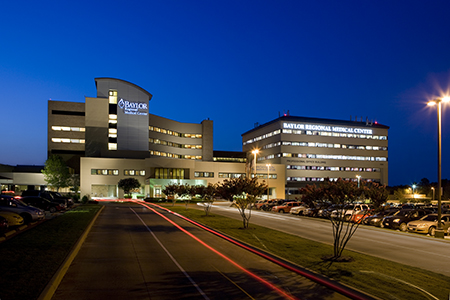
Baylor Regional Medical Center at Grapevine celebrates May as National Stroke Awareness Month. Stroke is the leading cause of disability and the fourth most common cause of death in the United States. Every 40 seconds, a person suffers a stroke and every four minutes, someone dies from it.
According to Asher S. Imam, D.O., vascular neurologist on the medical staff and medical director of the stroke program at Baylor Grapevine, stroke is a vascular injury to the brain that is caused by either obstruction of blood flow to the brain or from a rupture of the blood vessel in the brain. A transient ischemic attack (TIA) is a warning sign that precedes a stroke. It is important to seek medical attention for TIA symptoms in order to minimize the chances of it leading to a stroke.
Stroke is one of the most time sensitive disease processes having only one FDA approved drug for the treatment of stroke - tPA (tissue plasminogen activator). tPA can only be given from a known time of symptoms onset to 4.5 hours.
"The national standard of care for tPA (tissue plasminogen activator) treatment is a door-to-needle time less than 60 minutes after the onset of stroke, "says Dr. Imam. "At Baylor Grapevine, our goal is less than 30 minutes—with our fastest time being 18 minutes. This is impressive work by the health care team at Baylor and the EMS providers in the field."
According to new data (Stroke.2006; 37: 263-266)1, a patient ages by 3.1 weeks every 10 minutes care is delayed. For every hour of delayed care, they age 3.6 years.
Warning signs of a TIA or stroke
- Sudden onset of numbness, tingling, or weakness of the face, arm or leg, especially if these symptoms occur on one side of the body
- Sudden onset of loss of speech or comprehension, slurred speech or confusion.
- Trouble seeing either in one eye or both eyes
- Sudden onset of dizziness, loss of balance, loss of coordination or trouble walking
- Sudden and severe headache with no known cause
If you or anyone you know is experiencing these warning signs, please call 9-1-1 immediately.
Know Your Risk of a Stroke
Because many people do not know the risks of a stroke, Baylor Health Care System invites them to take this simple online quiz: www.strokequiz.com
Modifiable risk factors
- Hypertension is the most important modifiable risk factor for stroke. Because of the prevalence of this condition, hypertension can be attributed to 40 percent of strokes.
- Coronary Artery Disease: Patients with coronary artery disease have twice the stroke risk as patients without it. The presence of left ventricular hypertrophy (enlargement of left side of the heart) triples the risk and congestive heart failure quadruples the risk of stroke.
- Smoking tobacco doubles the risk of stroke. Even passive smoking can increase the risk.
- Obesity and diet: The most important risk determinant is the waist-hip ratio. The ratio greater than 0.93 for men and 0.86 for women almost triples the risk. The risk is higher for younger adults.
- Diabetes is an independent risk factor for both stroke and cardiovascular disease.
- Atrial-fibrillation is not a common, but a very powerful, risk factor for stroke.
- Alcohol: Alcohol consumption of more than two drinks a day has shown to increase the risk of stroke. The risk progressively goes up with increase in the alcohol intake.
- Other important risk factors for stroke include physical inactivity, untreated sleep apnea, chronic sleep deprivation, migraine headaches with aura, use of estrogen supplements and chronic stress.
"Low-dose aspirin is recommended for the primary prevention of stroke," said Dr. Imam. "However, you should discuss this option with your neurologist or primary care physician before beginning aspirin treatment."
For a referral to a neurologist on the medical staff at Baylor Grapevine, please call 1.800.4BAYLOR or visit FindDrRight.com.
* based on unaudited fiscal year 2013 financial statements
# # #
MEDIA CONTACT:
LaKisha Howard
lakisha.howard@baylorhealth.edu
office: (817) 329-2678
cell: (469) 263-9759
About Baylor Scott & White Health
As the largest not-for-profit health system in the state of Texas, Baylor Scott & White promotes the health and well-being of every individual, family and community it serves. It is committed to making quality care more accessible, convenient and affordable through its integrated delivery network, which includes the Baylor Scott & White Health Plan, Baylor Scott & White Research Institute, the Baylor Scott & White Quality Alliance and its leading digital health platform – MyBSWHealth. Through 51 hospitals and more than 1,200 access points, including flagship academic medical centers in Dallas, Fort Worth and Temple, the system offers the full continuum of care, from primary to award-winning specialty care. Founded as a Christian ministry of healing more than a century ago, Baylor Scott & White today serves more than three million Texans. For more information, visit: BSWHealth.com
